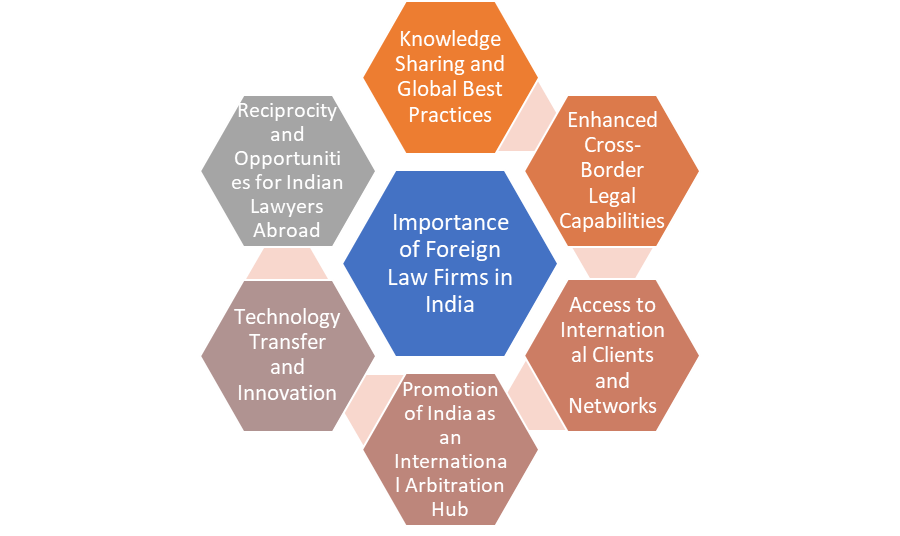Font size:
Print
Foreign Law Firms in India
India’s legal bridge is one of reciprocity, not roadblocks
Context: In May 2025, the Bar Council of India (BCI) notified the Rules for Registration and Regulation of Foreign Lawyers and Foreign Law Firms in India, ushering in a new chapter in the Indian legal landscape.
More on News
- While many stakeholders in the Indian legal fraternity welcomed this regulatory milestone, some U.S.-based law firms have raised objections, branding the rules as a “non-trade barrier” and a calculated attempt to exclude American firms from India’s legal ecosystem.
- However, these criticisms reflect a limited understanding of India’s constitutional and regulatory framework governing legal services.
- Far from being exclusionary, the BCI’s rules carefully balance liberalisation with regulation, ensuring both international engagement and domestic professional integrity.

Understanding the Criticism from the U.S. Law Firms
Critics from U.S. legal circles have raised six key objections:
- Non-tariff trade barriers: They argue the rules impose procedural hurdles that hinder American firms’ access to the Indian market.
- Lack of inclusion in consultations: U.S. interests were allegedly sidelined in pre-drafting discussions.
- Conflict with ABA confidentiality norms: The requirement to disclose details about legal work and clients is said to contradict American standards.
- Fly-in, fly-out limitations: The restrictions are claimed to be non-reciprocal compared to Indian lawyers’ access in the U.S.
- No transition period: Critics argue that the rules were implemented without sufficient lead time.
- Impact on bilateral legal cooperation: They suggest that the rules may deter Indian businesses from seeking U.S. legal expertise.
Legal Practice in India: Not a Trade Issue
- First and foremost, legal practice in India is not a matter of international trade.
- The BCI is a statutory body, not a trade negotiator. Under Entries 77 and 78 of the Union List, the Constitution of India treats legal services as distinct from trade and commerce, which are covered separately under the Seventh Schedule.
- Recent Indian legal precedent—particularly the 2024 judgment in Bar of Indian Lawyers vs D.K. Gandhi—has reaffirmed that legal practice is a “contract of personal service,” fundamentally different from commercial activity.
- Consequently, it cannot be bundled into free trade agreements or subjected to market liberalisation pressures.
- In fact, India declined to include legal services in its recent UK-India Free Trade Agreement, reinforcing this stance.
Rules Are Not Prohibitive, They Are Regulatory
- Contrary to claims, the new BCI rules do not bar foreign lawyers. Instead, they offer a structured path for foreign law firms to operate within India, subject to registration, ethical compliance, and reciprocity.
- Rules 3 and 4 allow foreign firms to establish a presence in India under specific regulatory norms.
- The fly-in, fly-out provision, as per Rule 3(1), permits temporary visits for legal consultation, capped at 60 days per year.
- These are comparable to the restrictive and decentralised licensing systems that Indian lawyers face in the U.S., where legal practice requires state-specific bar exams and licensing.
Reciprocity and Compliance: A Two-Way Street
- Level Playing Field: U.S. lawyers seeking entry must comply with conditions similar to what Indian lawyers face abroad.
- This includes submission of a certificate of good standing, which some U.S. firms find challenging due to their decentralised regulatory structure.
- However, Rule 6 allows the BCI to assess such submissions holistically, providing ample room for contextual flexibility.
- Disclosing the Nature: Additionally, the requirement to disclose the nature of legal work is not an infringement of client confidentiality.
- The objective is to gather generalised data to ensure that foreign legal professionals operate within the permissible boundaries of Indian legal practice, rather than offer detailed client-specific insights.
Extensive Consultation, Not a Surprise Move
- Discussions on allowing foreign legal practice in India have been ongoing for over two decades.
- From expert committee reports to global consultations and landmark judgments like Lawyers Collective vs BCI (2009) and Bar Council of India vs A.K. Balaji (2018), the current rules are the culmination of a long, inclusive, and transparent process.
Subscribe to our Youtube Channel for more Valuable Content – TheStudyias
Download the App to Subscribe to our Courses – Thestudyias
The Source’s Authority and Ownership of the Article is Claimed By THE STUDY IAS BY MANIKANT SINGH





